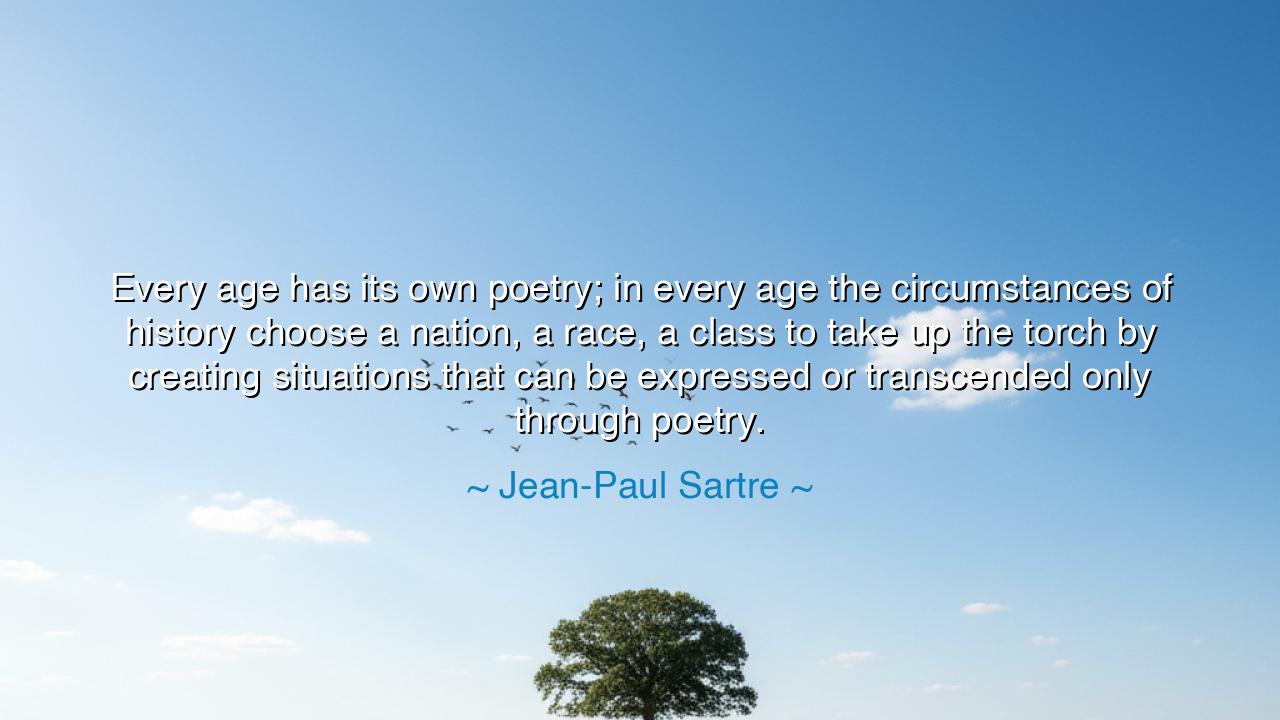
Every age has its own poetry; in every age the circumstances of
Every age has its own poetry; in every age the circumstances of history choose a nation, a race, a class to take up the torch by creating situations that can be expressed or transcended only through poetry.






In the grand flow of history, where the human spirit seeks to understand and transcend the trials and joys of its time, there is a truth as old as humanity itself: poetry is born from the conditions of its age. Jean-Paul Sartre profoundly observes, "Every age has its own poetry; in every age the circumstances of history choose a nation, a race, a class to take up the torch by creating situations that can be expressed or transcended only through poetry." These words speak to the power of poetry to capture the essence of an era, to give voice to the unspeakable, and to express the struggles and dreams that define the moment. Poetry is not just art; it is the soul of a generation, a mirror that reflects the struggles and hopes of its people.
The ancients understood that poetry was the voice of their world. In Homer's epics, the Iliad and the Odyssey, we see poetry emerging from the depths of war, heroism, and the search for identity. Homer wrote not just of gods and heroes, but of the struggles of his people—the Greeks—as they fought for their place in a vast, chaotic world. The Trojan War, with all its bloodshed and glory, was the poetry of the age—a story that transcended mere historical events and captured the human condition in all its valor, betrayal, and longing. Poetry was, and remains, the language of transformation, capable of expressing what history alone cannot convey.
Similarly, in Rome, the poetry of Virgil in his Aeneid encapsulated the founding of a new empire. Virgil's poetry was not simply a narrative of conquest but a reflection of the values that Rome sought to embody: duty, sacrifice, and the divine right of their destiny. Poetry became the vehicle for a people to understand their own historical journey, to make sense of their past, and to project their future. The Romans, like the Greeks before them, found their spirit, their triumph, and their tragedy through poetry. It was their language of destiny, guiding them through the tumult of history.
In Sartre’s reflection, we see the timeless truth that each era has a unique poetry—one that reflects not just the outward struggles, but the inner soul of a people. The French Revolution, with its cries for liberty, equality, and fraternity, gave rise to a generation of poets who sought to express the ideals of a nation in the throes of change. Victor Hugo, whose words transcended the turmoil of his time, captured the struggle of the oppressed in works such as Les Misérables. Hugo's poetry, like the poetry of the ancients, was not just a reflection of historical events; it was the expression of human aspirations in the face of unbearable circumstances.
In the modern world, poetry continues to be born from the struggles of those who face injustice, oppression, and identity crises. Langston Hughes, in the early 20th century, gave voice to the experience of African Americans through his powerful words during a time of intense racial strife. His poetry became the rallying cry for a people seeking to express and transcend the chains of oppression. Much like the ancient poets who spoke for their nations, Hughes used his words to give voice to the marginalized—showing that poetry is more than beauty; it is the weapon of the oppressed, the expression of a people’s resilience and hope.
Sartre’s words remind us that poetry is not just the art of beauty, but the voice of the age, the expression of the human struggle. It is through poetry that we can capture the impossible—the experiences and emotions that cannot be fully expressed through mere prose or logic. As the world changes, as history unfolds, so too does the poetry that accompanies it. Every struggle, every fight for freedom, and every call for change demands poetry. Sartre’s insight encourages us to understand that poetry is not the preserve of a few, but the language of all humanity—its triumphs and its failures.
The lesson is clear: to understand the spirit of an age, one must look to its poetry. It is through poetry that we see the soul of a generation. Whether through Homer's epics, Hughes’ verses, or the work of modern poets, we gain insight into the yearnings and struggles of the people who lived in those times. Each poem becomes a testament, a living expression of a particular moment in history. In our own lives, we must recognize the importance of expressing the struggles and hopes of our time, for it is through this expression that we not only understand our world but also transcend it.
Practical action calls us to embrace poetry as both a personal and collective tool. Seek out the poets of today, listen to their voices, and recognize the themes that define the world around you. Whether through writing, reading, or simply appreciating the poetry of others, allow yourself to engage with the soul of your age. Just as the poets of the past shaped their worlds with words, so too can you shape your own with the power of expression. Poetry remains a living force—and by engaging with it, you help shape the world that will one day be remembered in the poetry of the future.






AAdministratorAdministrator
Welcome, honored guests. Please leave a comment, we will respond soon